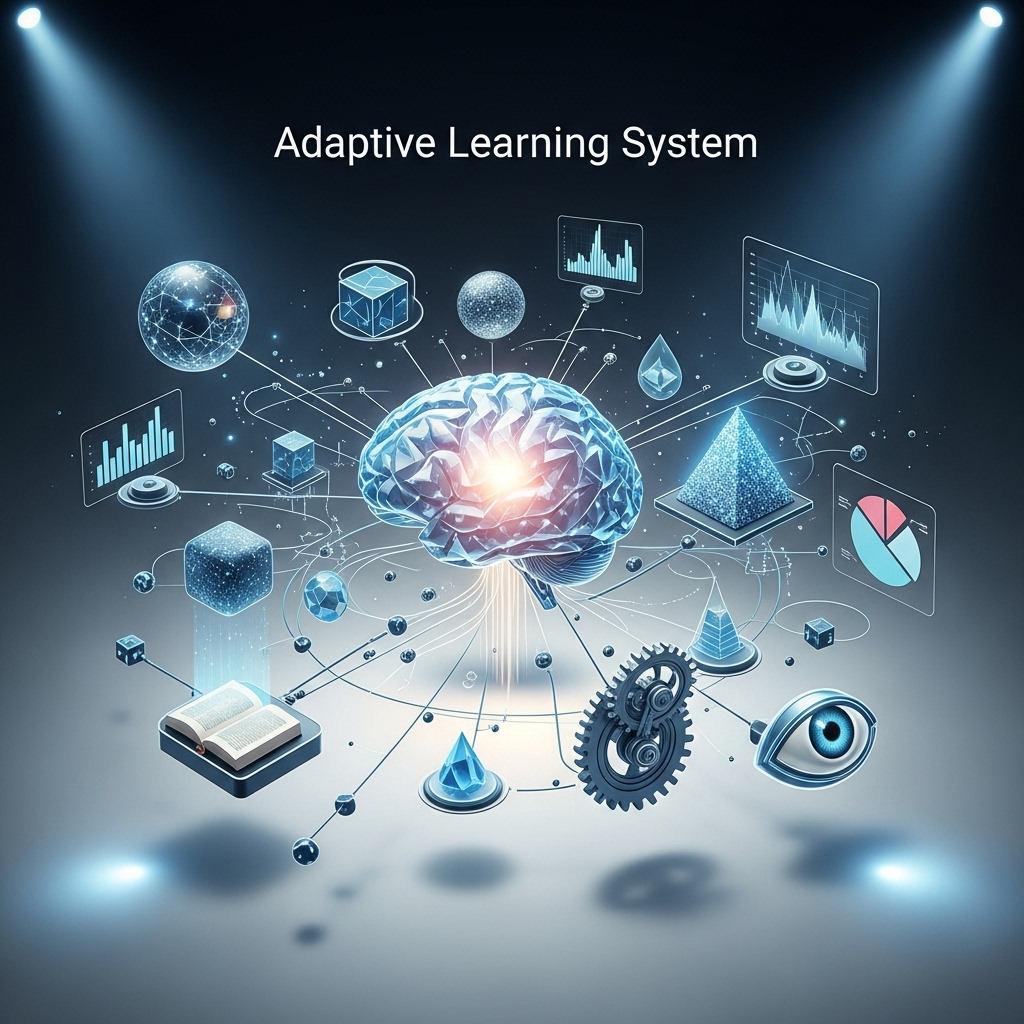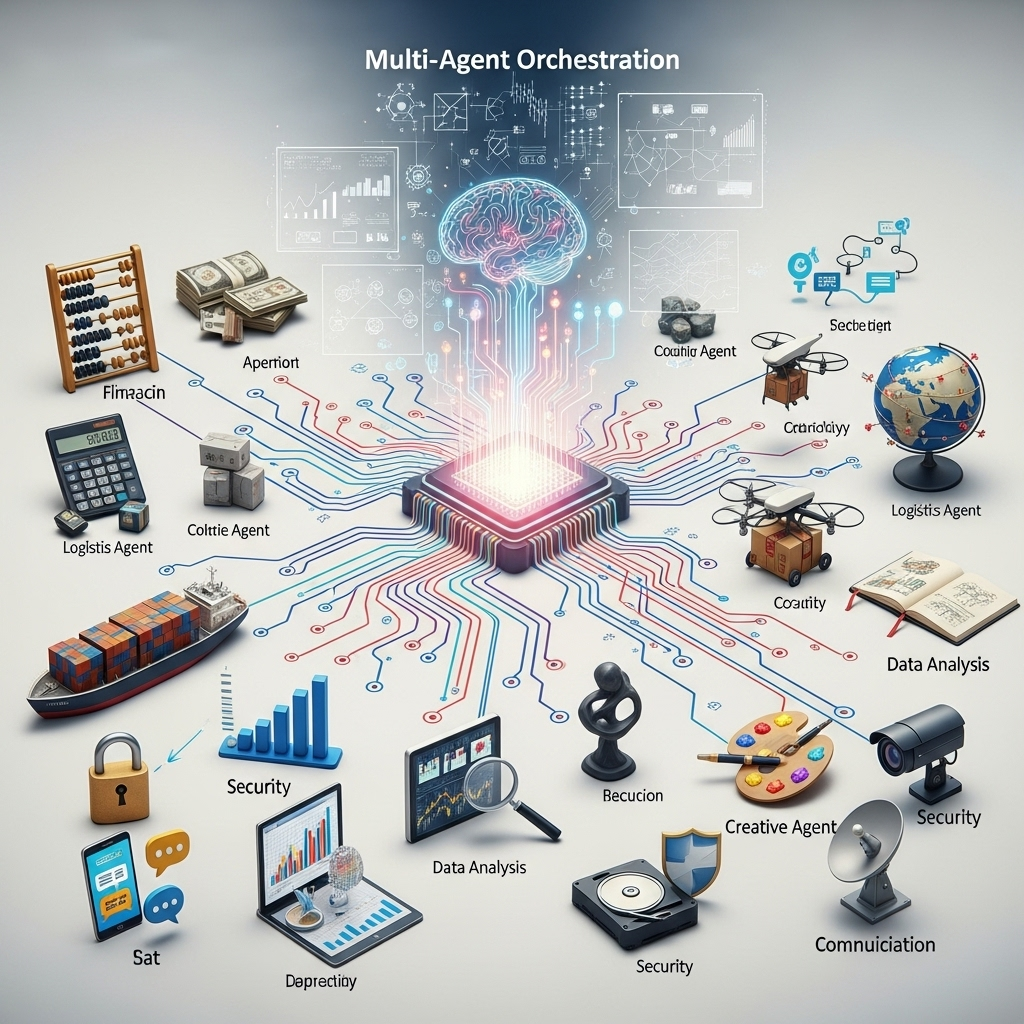Revolutionizing production operations through intelligent autonomous manufacturing systems
Manufacturing represents the backbone of global economic activity, yet traditional approaches often struggle with complexity, variability, and the need for rapid adaptation to changing market demands. Agentic AI transforms manufacturing by creating intelligent systems that can optimize production processes, ensure quality control, predict maintenance needs, and adapt to changing conditions in real-time. These autonomous agents understand manufacturing processes at a granular level, making intelligent decisions that enhance efficiency, quality, and safety while reducing costs and waste.
Unlike traditional manufacturing automation that follows predetermined sequences, Agentic AI brings cognitive capabilities that can reason about production challenges, learn from experience, and optimize operations continuously. These systems integrate with existing manufacturing infrastructure while adding layers of intelligence that transform reactive operations into proactive, adaptive manufacturing ecosystems.

Effective manufacturing requires sophisticated coordination of resources, materials, and processes across complex production networks. Agentic AI revolutionizes production planning by creating dynamic scheduling systems that adapt to changing conditions while optimizing multiple objectives including cost, quality, delivery time, and resource utilization.
Our AI agents continuously optimize production schedules by analyzing demand forecasts, material availability, machine capacity, labor resources, and quality requirements. The system adapts schedules in real-time as conditions change, minimizing disruptions while maintaining optimal resource utilization and on-time delivery performance.
Manufacturing operations must balance multiple, often conflicting objectives. Our Agentic AI excels at multi-objective optimization by:
Optimal capacity utilization requires understanding demand patterns, production capabilities, and resource constraints. Our AI continuously analyzes capacity requirements, identifies bottlenecks, and optimizes resource allocation to maximize throughput while maintaining flexibility for future demands.

Quality control in modern manufacturing requires sophisticated monitoring, analysis, and corrective action capabilities that can identify issues before they impact product quality or customer satisfaction. Agentic AI transforms quality management by implementing intelligent systems that continuously monitor processes, predict quality issues, and implement corrective actions automatically.
Our AI agents monitor production processes continuously using sensor data, machine vision, and process parameters to detect quality variations in real-time. The system understands normal process variation and can distinguish between acceptable variation and true quality issues, providing immediate alerts and automated responses when quality standards are at risk.
Traditional quality control relies on inspection after production, often discovering issues too late to prevent defective products. Our AI transforms quality management by:
Statistical process control provides the foundation for quality management, but traditional SPC approaches are limited by manual interpretation and delayed responses. Our AI enhances SPC by providing intelligent interpretation of control charts, automatic detection of special causes, and proactive process adjustments that maintain processes in statistical control.
Equipment reliability is crucial for manufacturing operations, yet traditional maintenance approaches are either reactive or based on predetermined schedules that may not reflect actual equipment condition. Agentic AI revolutionizes maintenance by implementing predictive systems that understand equipment health, predict failure modes, and optimize maintenance activities.
Our AI continuously monitors equipment condition using multiple data sources including vibration sensors, temperature measurements, pressure readings, and operational parameters. The system learns normal equipment behavior patterns and can detect subtle changes that indicate developing problems, enabling proactive maintenance before failures occur.
Different equipment components fail in different ways and at different rates. Our AI understands specific failure modes for different equipment types and can predict not just when failures might occur, but what type of failure is most likely. This enables targeted maintenance activities that address specific failure risks while optimizing maintenance costs and equipment uptime.
Effective maintenance requires balancing equipment reliability with maintenance costs and production schedules. Our AI optimizes maintenance planning by coordinating maintenance activities with production schedules, optimizing spare parts inventory, and scheduling maintenance to minimize production disruptions while maximizing equipment reliability.

Manufacturing operations depend on reliable supply chains and effective materials management to maintain production schedules and quality standards. Agentic AI integrates manufacturing operations with supply chain management to optimize material flows, reduce inventory costs, and ensure production continuity.
Manufacturing inventory management requires balancing availability with carrying costs while managing uncertainty in demand and supply. Our AI optimizes inventory levels by understanding usage patterns, supplier reliability, and production requirements to maintain optimal inventory levels that support production while minimizing costs.
Modern manufacturing relies on close coordination with suppliers to ensure material quality, delivery reliability, and cost optimization. Our AI facilitates supplier integration by sharing production forecasts, coordinating delivery schedules, and monitoring supplier performance to ensure optimal supplier relationships.
Energy costs represent a significant portion of manufacturing expenses, while environmental sustainability is becoming increasingly important for regulatory compliance and corporate responsibility. Agentic AI optimizes energy usage and environmental performance while maintaining production efficiency and quality standards.
Our AI optimizes energy consumption by understanding production energy requirements, utility rate structures, and operational constraints. The system can shift production schedules to take advantage of lower energy rates, optimize equipment operation for energy efficiency, and coordinate with renewable energy sources to minimize environmental impact.
Manufacturing waste represents both environmental impact and economic loss. Our AI identifies waste reduction opportunities, optimizes material utilization, and coordinates waste recovery and recycling activities to minimize environmental impact while improving economic performance.

Manufacturing operations involve close collaboration between human workers and automated systems, requiring intelligent coordination that enhances productivity while ensuring safety. Agentic AI creates collaborative manufacturing environments where humans and machines work together optimally.
Effective manufacturing combines human creativity and problem-solving with machine precision and consistency. Our AI facilitates optimal human-machine collaboration by assigning tasks based on relative capabilities, providing intelligent assistance to human workers, and ensuring seamless coordination between human and automated activities.
Manufacturing safety requires continuous monitoring of work environments, equipment status, and worker activities. Our AI enhances safety by monitoring safety conditions, predicting potential hazards, and implementing preventive measures to maintain safe working environments.
Modern markets demand manufacturing systems that can produce customized products efficiently while maintaining cost competitiveness. Agentic AI enables mass customization by creating flexible manufacturing systems that can adapt to product variations without sacrificing efficiency.
Our AI creates production systems that can adapt to product variations by automatically reconfiguring equipment, adjusting process parameters, and coordinating material flows for different product specifications. The system maintains efficiency while providing the flexibility needed for customized production.
Manufacturing operations must adapt throughout product lifecycles from introduction through growth, maturity, and decline phases. Our AI integrates with product lifecycle management to optimize production strategies for different lifecycle phases while maintaining operational efficiency and profitability.

Digital twins provide powerful tools for understanding and optimizing manufacturing operations by creating virtual representations of physical systems. Agentic AI leverages digital twin technology to simulate operations, test optimization strategies, and predict the impact of changes before implementation.
Digital twins enable comprehensive testing of process changes and optimization strategies without disrupting actual production. Our AI uses digital twins to simulate different operating scenarios, test improvement ideas, and optimize process parameters before implementing changes in the physical system.
New equipment and process implementations traditionally require extensive physical testing and training. Our AI uses digital twins to support virtual commissioning of new equipment and provide realistic training environments for operators, reducing implementation time and training costs.
Industry 4.0 represents the integration of cyber-physical systems, IoT, and advanced analytics in manufacturing. Agentic AI serves as the intelligence layer that coordinates these technologies to create truly smart manufacturing operations.
Our AI integrates with IoT sensors and edge computing systems to provide real-time intelligence throughout manufacturing operations. The system processes sensor data locally for immediate responses while coordinating with enterprise systems for comprehensive optimization and planning.
Smart manufacturing requires seamless coordination between physical manufacturing processes and digital control systems. Our AI provides the intelligence needed to coordinate cyber-physical systems, ensuring optimal performance while maintaining safety and reliability.

Manufacturing excellence requires continuous improvement based on data analysis, experimentation, and learning from experience. Agentic AI enables systematic continuous improvement by identifying improvement opportunities, testing changes, and implementing successful improvements across operations.
Understanding performance requires comprehensive analytics that identify improvement opportunities and track progress over time. Our AI provides detailed performance analytics, benchmarks operations against best practices, and identifies specific improvement opportunities with quantified benefits.
Continuous improvement requires systematic experimentation and learning. Our AI conducts automated experiments to test improvement ideas, analyzes results to identify successful changes, and implements improvements while monitoring impact on overall performance.
Manufacturing technology continues evolving with developments in robotics, additive manufacturing, artificial intelligence, and advanced materials. Our Agentic AI platform adapts to incorporate emerging technologies while maintaining operational continuity and performance optimization.
Future developments include integration with advanced robotics, additive manufacturing coordination, autonomous material handling, and enhanced human-machine interfaces. The goal remains consistent: creating intelligent manufacturing systems that adapt to changing requirements while optimizing performance across multiple dimensions.
Agentic AI in manufacturing represents a fundamental transformation in how products are made, creating more intelligent, efficient, and adaptable production systems that can respond to changing market demands while maintaining quality, safety, and environmental standards. By combining advanced AI capabilities with deep manufacturing expertise, we enable organizations to achieve manufacturing excellence in an increasingly competitive global marketplace.
← Back to Main Page